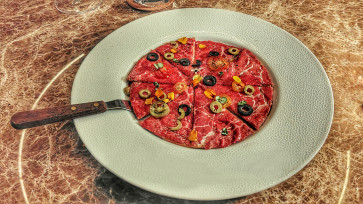Popular Reads
Top Results
Can't find what you're looking for?
View all search resultsPopular Reads
Top Results
Can't find what you're looking for?
View all search resultsRamadan delights: Savoring Turkish sweets
Nestled at a cultural and culinary crossroads between Europe and Asia, Turkey boasts a rich cuisine, but people need to find the right time to savor the delicacies
Change text size
Gift Premium Articles
to Anyone
N
estled at a cultural and culinary crossroads between Europe and Asia, Turkey boasts a rich cuisine, but people need to find the right time to savor the delicacies. Ramadan, or Ramazan as the Turkish call it, is one special time of the year to enjoy the culinary journey.
There are unique dishes cooked especially to celebrate the holy month. During Ramadan, people try their best to attend the cherished occasion of having dinner with family members, Turkish Ambassador Aydin Evirgen said.
Almost all city administrations usually organize breaking the fast ceremonies for the needy, Evirgen said.
“People pretend to be wealthy when breaking the fast. Tables are full of delicious colorful dishes and special foods that can only be found during Ramadan,” he added.
For example, during Ramadan Turkish bakers bake special breads, adding milk and black and white sesame seed for a more tender taste.
“We normally see people lining up in front of bakery shops to buy the special breads to bring home,” Evirgen said.
People usually start with hoşaf, compote made from dried fruits like figs, prunes, apricots and raisins, chef Sezai Zorlu from Turkish restaurant Anatolia said, adding that the compote is a good choice for breaking the fast because dried fruits have more nutritional fiber for replenishment after a day of fasting.
“Hoşaf must be served warm. After a day of fasting, you don ft want to serve cold drinks. Your internal organs need tender food that can boost energy, Zorlu said.
The second meal usually consists of cold olive oil dishes, such as artichoke, which is good for the heart, he added.
Next it is time for a hot appetizer, such as borek, a pastry filled with meat, spinach and cheese.
However, during Ramadan, borek is are usually baked, not fried. A salad follows the hot appetizer.
“Turkey has a strong tradition of family dining. Our dishes are not fast food, they are prepared over long hours. Especially for Ramadan, there are these sentimental dishes. We really enjoy and savor every meal. We can spend two hours around the dinner table,” Zorlu said.
For the main course, Turkish people usually have either lamb, fish or chicken, the ambassador said.
During Ramadan meat is moderately spiced and then grilled, baked or steamed, but not fried, and then mixed with vegetables, Zorlu added.
“Our dishes are olive-oil based. For Ramadan, we also reduce the spices we use because we don’t want the foods to be too heavy,” he said.
There is ayran to drink, a yogurt mixed with water, as well as shorbet, which is tastes like fruit.
During Ramadan, the Turkish have a unique dessert called gullaç. Made from layers of corn starch, warm milk and topped with grated walnut or pistachio, the dessert is a perfect dish to close a Ramadan dinner.
Recipe: hoşaf
Ingredients:
• Almost any kind of dried fruit, such as figs, prunes, apricots and raisins.
• Orange blossom water (made from the orange flower ), or rose water essence.
• Cinnamon.
• Mint leaf.
How to make it:
• Soak ingredients in light syrup for one hour.
• Boil dried fruits, cinnamon and orange blossom water (or rose water) for 15 minutes on a medium heat.
• Serve with sprig of mint leaf










